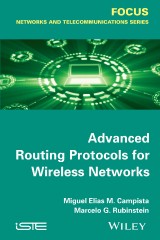Details

Advanced Routing Protocols for Wireless Networks
1. Aufl.
|
139,99 € |
|
| Verlag: | Wiley |
| Format: | |
| Veröffentl.: | 03.06.2014 |
| ISBN/EAN: | 9781118984901 |
| Sprache: | englisch |
| Anzahl Seiten: | 152 |
DRM-geschütztes eBook, Sie benötigen z.B. Adobe Digital Editions und eine Adobe ID zum Lesen.
Beschreibungen
This text introduces the principles of routing protocols and metrics as they affect wireless networking environments, specifically in urban areas. Timely because of the recent rise in small city life, this topic includes the consideration of ad hoc, mesh, vehicular, sensor, and delay tolerant networks. These approaches are each unique, and author Miguel Mitre Campista provides a thorough, but accessible, explanation of their individual characteristics for engineers, computer scientists, IT professionals, and curious Internet users.
<p><i>PREFACE ix</i></p> <p><i>INTRODUCTION xi</i></p> <p><b>CHAPTER 1. WIRELESS NETWORKING BASIC ASPECTS 1</b></p> <p>1.1. Introduction 1</p> <p>1.2. Link layer 1</p> <p>1.2.1. Contention-based protocols 2</p> <p>1.2.2. Contention-free protocols 5</p> <p>1.3. Physical layer 6</p> <p>1.4. IEEE 802.11 9</p> <p>1.4.1. Link layer 9</p> <p>1.4.2. Physical layer 11</p> <p>1.5. Summary 12</p> <p><b>CHAPTER 2. BASIC ROUTING CONCEPTS 13</b></p> <p>2.1. Introduction 13</p> <p>2.2. Distance-vector-based algorithms 14</p> <p>2.3. Link-state-based algorithms 15</p> <p>2.4. Summary 15</p> <p><b>CHAPTER 3. AD HOC ROUTING 17</b></p> <p>3.1. Introduction 17</p> <p>3.2. Architecture 18</p> <p>3.3. Routing metrics 19</p> <p>3.4. Routing protocols 20</p> <p>3.4.1. Proactive protocols 21</p> <p>3.4.2. Reactive protocols 24</p> <p>3.4.3. Hybrid protocols 28</p> <p>3.5. Summary 30</p> <p><b>CHAPTER 4. MESH ROUTING 31</b></p> <p>4.1. Introduction 31</p> <p>4.2. Architecture 33</p> <p>4.3. Routing metrics 36</p> <p>4.4. Routing protocols 44</p> <p>4.4.1. Ad-hoc-based protocols 44</p> <p>4.4.2. Controlled flooding protocols 47</p> <p>4.4.3. Opportunistic protocols 49</p> <p>4.4.4. Traffic-aware protocols 53</p> <p>4.5. Summary 56</p> <p><b>CHAPTER 5. VEHICULAR ROUTING 57</b></p> <p>5.1. Introduction 57</p> <p>5.2. Architecture 58</p> <p>5.3. Routing metrics 58</p> <p>5.4. Routing protocols 58</p> <p>5.4.1. Topology-based protocols 59</p> <p>5.4.2. Position-based protocols 61</p> <p>5.4.3. Opportunistic protocols 64</p> <p>5.4.4. Information dissemination protocols 67</p> <p>5.5. Summary 70</p> <p><b>CHAPTER 6. SENSOR ROUTING 71</b></p> <p>6.1. Introduction 71</p> <p>6.2. Architecture 72</p> <p>6.3. Routing metrics 73</p> <p>6.4. Routing protocols 75</p> <p>6.4.1. Data-centric protocols 76</p> <p>6.4.2. Hierarchical or cluster-based protocols 81</p> <p>6.4.3. Location-based protocols 85</p> <p>6.4.4. QoS-aware protocols 89</p> <p>6.5. Summary 92</p> <p><b>CHAPTER 7. DELAY- AND DISRUPTION-TOLERANT NETWORK ROUTING 93</b></p> <p>7.1. Introduction 93</p> <p>7.2. Architecture 96</p> <p>7.3. Routing metrics 99</p> <p>7.4. Routing protocols 101</p> <p>7.4.1. Opportunistic protocols 102</p> <p>7.4.2. History-based protocols 105</p> <p>7.4.3. Model-based protocols 109</p> <p>7.4.4. Social-based protocols 110</p> <p>7.5. Summary 115</p> <p><i>CONCLUSION 117</i></p> <p><i>BIBLIOGRAPHY 119</i></p> <p><i>INDEX 129</i></p>
<p><strong>Miguel Elias Mitre Campista, Associate Professor with Universidade Federal do Rio de Janeiro</strong><br />Miguel Elias Mitre Campista received his telecommunications engineering degree from Fluminense Federal University (UFF), Rio de Janeiro, Brazil, in 2003, and M.Sc. and D.Sc degrees in electrical engineering from Federal University of Rio de Janeiro (UFRJ) in 2005 and 2008, respectively. In 2009 he was an associate professor with the Telecommunications Engineering Department of UFF. Since 2010 he has been as associate professor with the Electronic and Computer Engineering Department of UFRJ. Professor Miguel has spent one year as an invited Professor with LIP6 at the Université Pierre et Marie Currie, in France. Recently, he has received a scholarship from the Brazilian government (CNPq) for his research achievements. His major research interests are in wireless routing, opportunistic networking, quality of service, and home networking. <p><strong>Marcelo Gonçalves Rubinstein, Associate Professor with Universidade do Estado do Rio de Janeiro</strong><br />Marcelo G. Rubinstein was born in Rio de Janeiro, Brazil, on August 29, 1971. He received a B.Sc. degree in Electronics Engineering and M.Sc. and D.Sc. degrees in Electrical Engineering from Universidade Federal do Rio de Janeiro, Brazil, in 1994, 1996, and 2001 respectively. From January to September 2000 he was at the PRiSM Lab from the University of Versailles, France. From December 2001 to February 2002 he was a research fellow (grant holder from FAPERJ) at the Grupo de Teleinformática e Automaç?o from Universidade Federal do Rio de Janeiro. He is now an Associate Professor with Universidade do Estado do Rio de Janeiro. He is also a CNPq Researcher. His major interests are in wireless networks, home networking, medium access control, and quality of service.


















